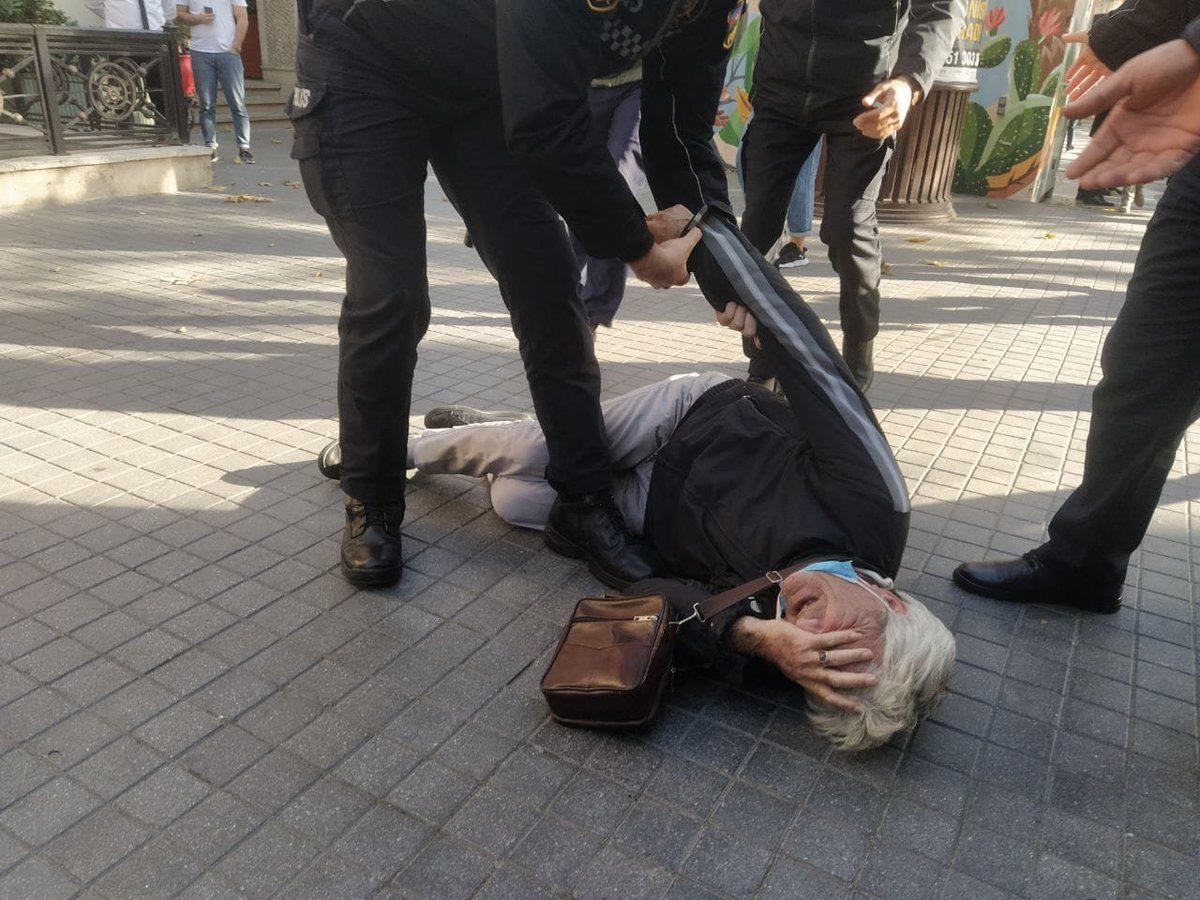MP’s opinion: 'Yagublu is being used to portray Azerbaijan’s authorities as inhumane'
Tofiq Yagublu’s hunger strike
One of Azerbaijan’s most prominent opposition figures, Musavat Party and National Council of Democratic Forces member Tofiq Yagublu, who is currently imprisoned, announced a hunger strike “to the death” starting from 1 April.
He declared the hunger strike in response to a court ruling that sentenced him to nine years in prison. Yagublu has been charged with fraud and document forgery, but he maintains that the case is politically motivated.
MP Zahid Oruj, chair of the parliamentary committee on human rights, outlined Azerbaijan’s official position in a comment to JAMnews.

Oruj stressed that he does not believe Tofiq Yagublu’s hunger strike will alter Azerbaijan’s political course:
“Overall, I am against treating this situation as an isolated incident against the backdrop of ongoing regional and international developments.
This protest has received no support from Azerbaijani society, public figures, or representatives of the arts. Politics framed as a confrontation between the authorities and opposition groups has become a marginal phenomenon.
In any case, we support efforts to find solutions to such issues. This requires action from NGOs specialising in human rights, as well as individuals whose positions are respected by both sides. Perhaps the Musavat party, which considers Tofiq Yagublu an ally, should have intervened earlier to shield him from forces that have built their politics for years on exploiting human lives.”
Tofiq Yagublu’s statement
Announcing his decision to begin a hunger strike, Yagublu said:
“I am protesting against the unfounded, unlawful and dishonourable sentence sentencing me to nine years in prison. I know this will be very difficult, but I am determined to take this step.”
He added that with age, he has come to see the pointlessness of spending the final years of his life behind bars. “I have decided to die in prison,” Yagublu declared, expressing hope that this act would draw international attention to the situation in Azerbaijan.
“If you want to support me — read and share my final speech in court. It will give you and others undeniable arguments for criticising and exposing the Aliyev regime’s judicial system.”
Yagublu was arrested on 14 December 2023 during the latest wave of detentions targeting civil society activists.
He faces criminal charges under Articles 178.3.2 (fraud causing significant damage), 320.1 (forgery, illegal manufacture or sale of official documents, state awards, seals, stamps or forms), and 320.2 (use of knowingly forged documents) of the Azerbaijani Criminal Code. The international community views his arrest as politically motivated.
“Yagublu is being turned into a ‘sacred victim’” — MP
MP Zahid Oruj notes that although Tofiq Yagublu is known for his hardline stance against the authorities, he has not always aligned his political activity with the positions of the Musavat Party or the National Council of Democratic Forces. He emphasised that Yagublu’s struggle eventually became a personal one, influenced by certain political forces within the country.
“Unfortunately, some foreign circles — interested in destabilising the political situation in Azerbaijan, weakening its regional and international standing, and damaging relations between Turkey and Azerbaijan via Armenia — are attempting to interfere in domestic processes.”
Oruj claimed that the “unsuccessful” Popular Front Party is trying to turn Yagublu into a “sacred victim”.The alleged aim is to portray the authorities as inhumane, damage the country’s international image, and gain political dividends.
“They want to use Yagublu to construct an inhumane image of the Azerbaijani government, to undermine its international reputation and victorious image, and to score political points. His hunger strike has become part of the opposition’s strategy in their struggle against the authorities. The question is whether Yagublu himself realises this.
I know Yagublu personally. He used to take a more moderate stance. But over time, he has become someone who entirely denies any achievements of the state.”
Oruj added that the situation amounts to a political provocation and that certain foreign forces are using Yagublu for their own interests. He warned that the hunger strike could become a tool for external actors meddling in Azerbaijan’s internal affairs.
“This issue can be resolved through the Penitentiary Service and certain organisations,” the MP said.
Oruj stressed that all issues must be resolved legally, warning that politicisation only hinders the search for truth. He suggested that ending the hunger strike and seeking more civilised solutions would be the preferable course of action.
External and internal pressure
Oruj noted that this incident takes on added significance at a time when Azerbaijan’s international policy is facing heightened tensions.
“USAID, exposed by the U.S. president, and its European influence networks are trying to interfere in Azerbaijan’s internal affairs,” Oruj stated.
Oruj suggested that Yagublu’s defenders could negotiate with the Penitentiary Service, justice authorities, and the judiciary. This is a more civilised and constructive approach, he claimed.
“Those defending Tofiq Yagublu’s rights could attempt to engage in dialogue with government representatives,” he added.
History of Tofiq Yagublu‘s arrests
Tofiq Yagublu was first arrested on 12 September 1998 during an opposition rally in Baku’s Fountain Square ahead of the presidential elections. The court handed him a suspended two-year sentence. However, Yugublu claimed the charges were fabricated and politically motivated.
In 2013, he was arrested in connection with protests in Azerbaijan’s Ismayilli district. He was charged under Articles 233 (organising or actively participating in actions that disrupt public order) and 315 (resisting a representative of the authorities). On 17 March 2014, he was sentenced to five years in prison. Consequently, this arrest was strongly criticised by the international community, including the United States and the European Union.
During his imprisonment, Yagublu’s daughter, Nargiz Yagublu, passed away.
In March 2016, he was released under an amnesty.
In March 2020, he was arrested again under Article 221 (hooliganism). Human rights defenders described the case as fabricated. Eventually, the court sentenced him to four years and three months in prison.
On 2 September, he began a hunger strike to the death. After 16 days without food, a court placed him under house arrest on 18 September.
Tofiq Yagublu’s hunger strike






















